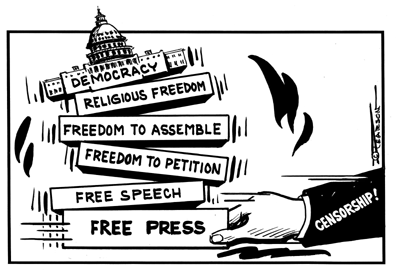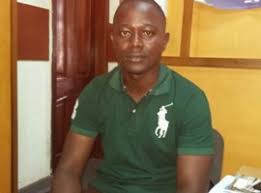Interview with Fredica Momoh, newscaster at Sierra Leone Broadcasting Corporation
Sierra Leone Broadcasting Service was recently transformed from being the state owned broadcaster, and one of the oldest broadcasting houses in West Africa, to Sierra Leone Broadcasting Corporation (SLBC), a public limited liability company. I spoke to Fredica Momoh, a dynamic and articulate 25 year-old newscaster and journalist at SLBC. Following, is an extract from the exclusive interview I conducted with her.
Roland Marke: Welcome Fredica Momoh to the United States. It’s my pleasure to interview you. What’s your purpose, visiting the United States?
Fredica Momoh: Thank you very much, Roland. Well, I’m visiting the United States to represent my country – Sierra Leone, in this year’s Microbicides Conference in Pittsburgh, Pennsylvania. Microbicide is the study of a substance designed to prevent and reduce sexual transmission of HIV and other sexually transmitted infections (STI’s), when applied topically inside the vagina or rectum, and possibly creating the HIV/Aids vaccine that would be distributed worldwide. I’m also attending Women’s Delivery Conference in Washington D.C. This conference concerns all females, and problems affecting women and girls around the world: Especially in Africa, where the maternal and infant mortality rate is alarming. This is a serious concern for women because of lack or inadequate medical attention, mostly in the rural areas of our communities. Women frequently die during child birth, or trying to carry out unsafe abortions. But thank God the rest of the world came together to execute the millennium development goals (MDGs) 4-5-6 and making sure that no woman would have to die giving birth to life – a precious child.
Highlight your impressions during participation at the recent conferences.
Well, everything went very well. I learnt a lot and am even taking some materials home to teach journalists and newscasters in the media, especially colleagues at SLBC, the knowledge I’ve recently gained. The conference was well organized, and there were about three thousand delegates, from around the world. It was a wonderful opportunity to meet an array of nationals from various countries and cultures. All the participants, including me, were opportune sharing diverse experiences, and that was exciting and educative.
 What other countries apart from the US have you visited before? Please share your experiences with us.
I have travelled to Ghana, Kenya, and Cape Town, South Africa. My experiences were wonderful. I had the opportunity of meeting other journalists around the world. We worked together and shared valuable experiences, and learning a lot of new ideas in the profession. I feel very fortunate and honored. Though as a female journalist in my country, we are faced with ongoing challenges from our male counterparts, who think that the profession is still male dominated. But once we’re courageously united, women would definitely forge ahead.
What is your background? Please tell readers about the work you do at SLBC, now that it’s officially a private enterprise.
Well, I don’t have much to say, except that am Fredica Momoh, a Sierra Leonean journalist working for the Sierra Leone Broadcasting Corporation, formerly called, SLBS. I work there as a news reporter, and am also a newscaster for both radio and television. I’m actually enjoying working there, now that it’s officially a private enterprise and even before that.   Â
Walk us through the process of transforming SLBC into a viable and profitable business entity.
The transition of SLBS to SLBC was not an easy task, moving from analogue to digital broadcasting equipments was really tough, and for the present government led by H.E President Ernest Bai Koroma, declaring SLBS a non-governmental broadcaster that will give equal opportunity to all political parties without fear or favor, or religious affiliation. In addition to providing commercial air time is definitely Herculean challenge.
How long have you worked for this broadcasting house and what do you find satisfying that keeps you fixated there?
I’ve been working for the former SLBS, now SLBC, for the past four years, and the motivation that keeps me hanging on there is that my job is satisfying and I just love my job. I think I have a lot to offer because the SLBC has made me what I am today, and am honestly grateful to SLBC.
Should we envision better days at SLBC in the horizon?
Â
Yes, better days are in the horizon not only because it is managed and operated by the private section, and that it is now a public broadcaster. It’s simply because Sierra Leonean journalists work hard, despite many challenges to the best of their abilities, and showcasing their talents as proud journalists of our beloved nation. Â
Are there future plans to further expand and modernize the services that SLBC already provides?
Sure, there are plans on the way to expand the services that SLBC provides. Â I can assure you, there are dynamic changes taking place right now, because the SLBC is moving fast in expanding its services, spearheaded by the current management and devoted team players, there must be light at the end of the tunnel.
What is your projection of SLBC in 5 years time? Do you have any other message you would like to send to our readers around the world?
Yes, there are plans underway; some of them have already materialized, while others are still in the pipeline. I’m telling you in the next five years people will see tremendous changes and efficient services. We have ingenuous Sierra Leonean minds at SLBC. We just need support and sponsorship with job training, to hone our talents and skills. I bet you, the team at the SLBC can work under challenging condition, and we are fast learners. I hope the International Community could do justice here, by providing scholarships for us to undergo relevant training, and motivate us with modern equipments and facilities, and that would make all the difference.
Roland Bankole Marke © 2010
Roland Bankole Marke is a Sierra Leonean, and the author of Harvest of Hate: Stories and Essays, Silver Rain and Blizzard, and Teardrops Keep Falling. He’s also a poet, songwriter and commentator, with a passion for humanity, especially giving voice to deprived women and children around the word. His website is www.rolandmarke.comStay with Sierra Express Media, for your trusted place in news!
© 2010, https:. All rights reserved.








Ed Smith
/
Hi, that was interesting to see how someone deals with a station goes from public to private and the issues it brings up. Thanks, Ed Smith
3rd July 2010conductknockoutbroadcastinterviews.com/blog